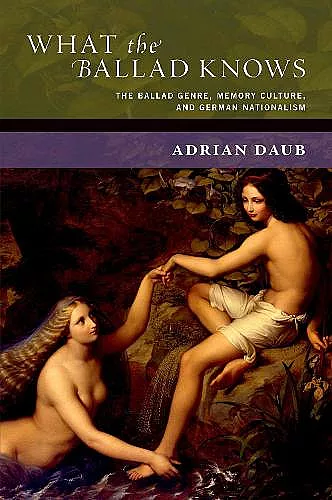What the Ballad Knows
The Ballad Genre, Memory Culture, and German Nationalism
Format:Hardback
Publisher:Oxford University Press Inc
Published:14th Nov '22
Currently unavailable, and unfortunately no date known when it will be back

Over the course of the 19th century, ballads proliferated in German-speaking Europe in a truly remarkable range of contexts. Audiences were of course likely encounter balladry in the volumes of Goethe and Schiller, in various anthologies or illustrated editions. But they were just as likely to come across objects billed as ballads in recitation evenings by popular actors, in song-settings by Schubert and Loewe, in piano pieces by Chopin, in the opera house and the concert hall, in mass-produced drawings, paintings and even chinaware. Ballads were poems one could use - schoolteachers used them to train their students' memory (or punish them), women composers used them to assert their place in the musical canon, actors used them to bolster their income, mothers used them to put their children to sleep. Ballads intersected with gender and class, promising to democratize art, while in fact helping make distinctions. In What the Ballad Knows: The Ballad Genre, Memory Culture and German Nationalism, Adrian Daub tells the story of this itinerant genre across media, periods, regions and social strata and shows that, even though it was often positioned as an authentic product of "German spirit," the ballad frequently unsettled and subverted the national project. The popular imagination rooted these poems in pre-modern oral culture, among bards and peasants in the everyday life of common folk. But in fact nineteenth-century ballads were in the end all about modernity – modern modes of association, of attention, of dissemination.
Adrian Daub's brilliant synthesis of the many lives of ballads in German culture breathes new and more complex meaning into Eric Hobsbawm's and Terence Ranger's concept of invented traditions. Daub calls the ballad "poetry one lived with," and his subtle, lucid analysis of its many contexts—travel, family, the schoolroom, the public sphere, the national imaginary—sketches a great arc of continuity in German life. It is erudite, graceful, and wise—a major achievement. * Celia Applegate, William R. Kenan, Jr. Professor of History, Professor of Musicology and Ethnomusicology, Professor of German, Russian, and European Studies, Vanderbilt University *
Readers with interests in lyric generally, in poetry and nationalism, and in poetry and music will learn a great deal from this beautifully written, wide ranging, and illuminating volume. * Hannah Vandegrift, Monatshefte *
This volume will be valuable for scholars of German literature and music history. * Choice *
What the Ballad Knows enacts an exemplary mission of recovery for a repertory that has enjoyed less eminence than its cousin, the lied. It will surely engender many followers, and possibly many epigones too. * Philip Ross Bullock, Wadham College, University of Oxford *
ISBN: 9780190885496
Dimensions: 163mm x 237mm x 24mm
Weight: 576g
296 pages